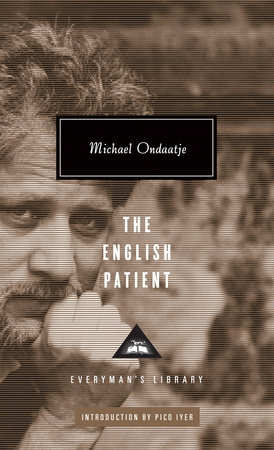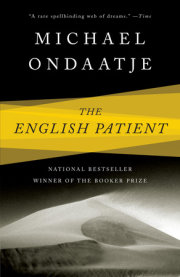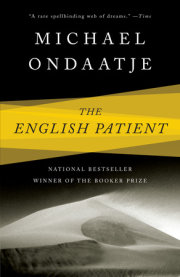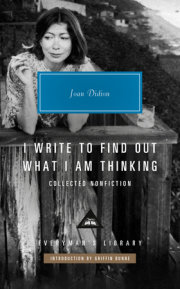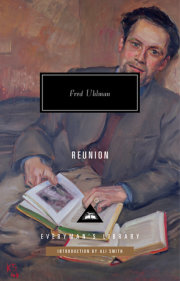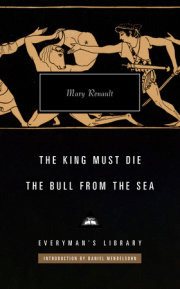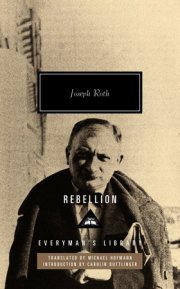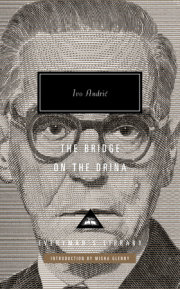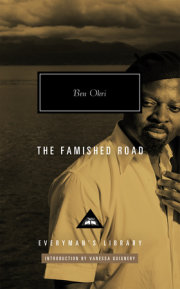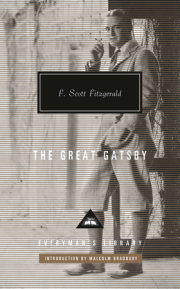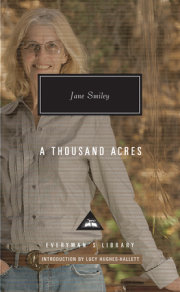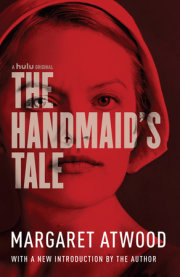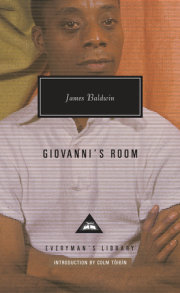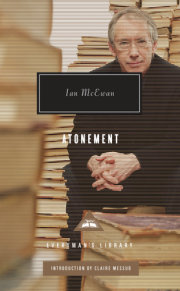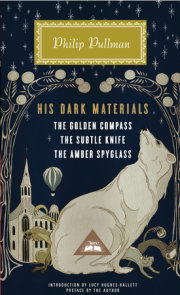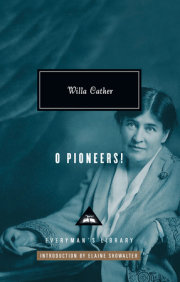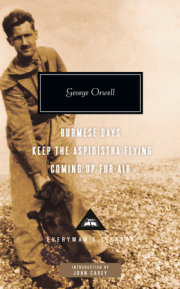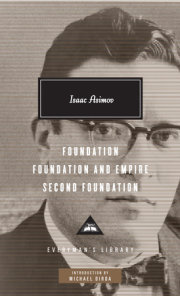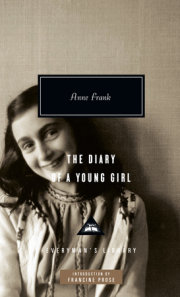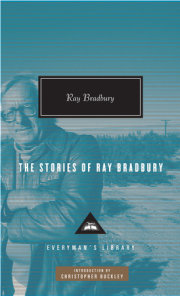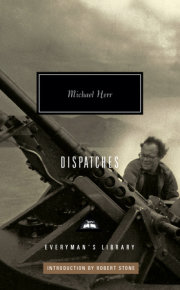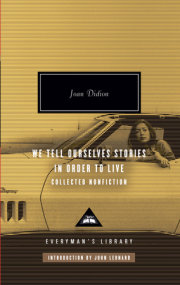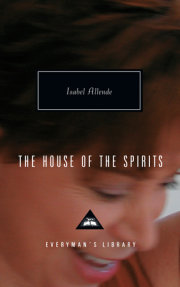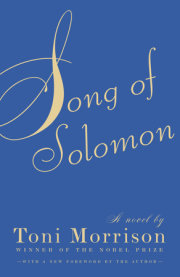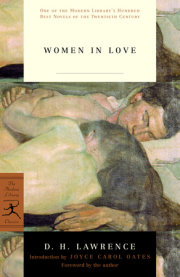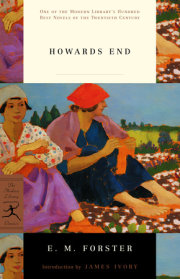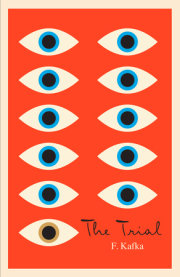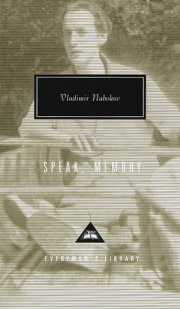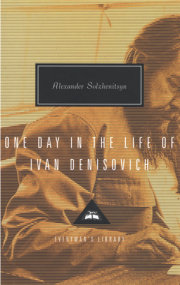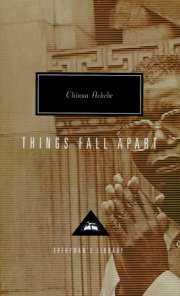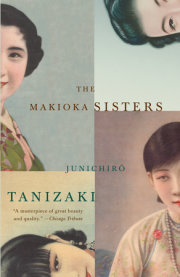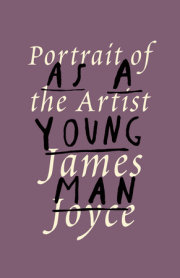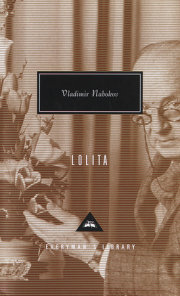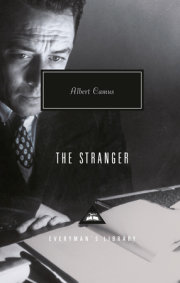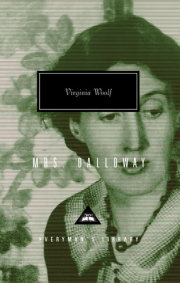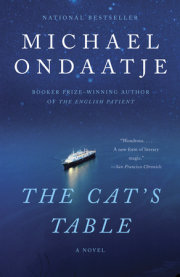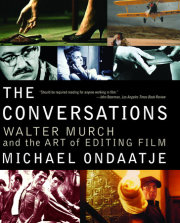I N T R O D U C T I O N
by Pico Iyer
A Lost Oasis in the Midst of WarMuch of what I love about
The English Patient can be found in a more or less typical paragraph, chosen almost at random, very close to the beginning of the book. In it Michael Ondaatje takes us into a library, between the kitchen and the ‘‘destroyed chapel’’ of the old nunnery in which the novel is set, during the closing days of World War II. The library contains, among its high walls of books, a sofa, a shrouded piano and the head of a stuffed bear. Like the people around it, it has absorbed a ‘‘wound’’ from violent shelling, yet now, partly open to the world, it accepts ‘‘the habits of weather, evening stars, the sound of birds.’’ It seems a safe place, ultimately, protective, even as lightning often flashes into it and the rain that comes in through a hole left by mortar attack has ‘‘doubled the weight of the books.’’
The library could not be more ordinary, in short, even though it’s scarred and haunted as the house’s residents are. Yet it’s full of things from everywhere – like the book in which it sits – and when you bring words and wounds and bears together, they create startling and often fresh combinations. The description of the room has a poet’s caressing lyricism, every word attentively chosen, yet each phrase also brings us new information. And even as we take it to be an unusually sensuous and exact evocation of a particular place, we can also note, if we’re so inclined, that the library belongs to both the house and the elements now, that its collection throws old worlds and new together and that the fact it is at once room and symbol ‘‘doubles the weight’’ of the book in our hands.
We’re in the middle of a pulsing, concrete, very human story, we realize, but also of a vision, in which each clause holds us with a special vividness – how many other novels in English describe green-black paste of ‘‘ground peacock bone’’ or eighteen different kinds of wind? – even as each detail also stands for something beyond itself. It’s as if Keats and Marshall McLuhan are collaborating in every sentence. Ondaatje’s rare, risk-taking tale of four wounded characters gathering in an abandoned nunnery to put their selves and their stories together as the global war winds down, holds us as the classic novels it invokes (
Anna Karenina and
The Charterhouse of Parma) might: with a gorgeously stirring and universal set of romances set against a complex political backdrop, all delivered in newborn prose that nonetheless pushes us towards a resolution of several mysteries.
But at the same time it spins a different, much larger story about an alternative world in the midst of war – the private claiming its own space away from the public. At a moment when people are dying because of the passports they carry or the races they represent, we meet a ‘‘very English’’ patient who isn’t (fatally) English; a sapper risking his life for the British army although he’s Indian, and will later become a doctor; a man whose name is ‘‘absurd’’, he confesses – David Caravaggio – and who, in spite of that name and the heritage it suggests, loses both thumbs to another Italian; and a nurse, Hana, whose name (like her nickname, ‘‘Pico’’) could come from anywhere. Every assumption we might make about these people’s lives and origins will be wrong, and the central character – without a name for much of the book and almost without a face – will bring them into a sanctuary of sorts, a place of candlelight and ancient texts, in which they will exchange histories, kisses, intelligence in a new world ‘‘unconscious of ancestry.’’
*
When an unassuming beige-covered set of publisher’s galleys arrived at my home in the early fall of 1992, I had no idea what was awaiting me. I knew of Michael Ondaatje’s uncommon ability to mix traditions and cultures from having read his acclaimed memoir,
Running in the Family, and I knew that he was a celebrated and radical poet in part because his lines weren’t entirely South Asian and yet didn’t only suggest ‘‘Upper America,’’ as he calls it; he belonged to a new mongrel tribe that had roots in every corner of the globe and would exult in the new harmonies and overlappings that could result. He had siblings on four continents and, of Burgher (mixed-race) descent, had spent his earliest years in colonial Ceylon before being educated in England and residing for most of his adult life in Canada. I remembered that his previous novel,
In the Skin of a Lion, had – no coincidence – told the story of the founding of Toronto in the early twentieth century by mostly immigrant bridgebuilders; I recalled that none of his details were casual and that it was no accident that his four protagonists in
The English Patient were a map-maker, a defuser of bombs, a nurse and (for good measure and proper, improper balance) a thief. Ondaatje in this book would be charting a map for a new kind of world; seeing how to disarm the instruments of war and national opposition; describing how broken individuals could be tended to and begin to heal; and offering a vision of deft appropriation.
But as I read the wildly unexpected pages – now he was describing (no coincidence again) a tightrope-walker in a lightning storm, now giving us oil-lamps made of snail shells – I quickly got pulled into a spell of sorts; I couldn’t look up for days, and I began racing through the ravishing scenes, each individual and somehow unprecedented, to see how the emotions would play themselves out. It was only after I’d put the book down that I noticed how original the whole thing was, how very different from the classic novels I’d read at school. There was no central point of view here; we cut very quickly between one scene and another, changing continents and worlds mid-sentence right to the very last clause (no wonder the book was quickly turned into an Academy Award-winning movie); there was no single story or truth, either. The world of common expectations and experience that we might find in a novel by Jane Austen had been blown to smithereens.
None of the main characters in the villas had a family, really, or a house or a steady job; there was no settled society to hold them in place. Most did not even seem to know who they were, deep down, and their histories came from everywhere. As we switch from a passage about Bedouin nomads to memories of a worm-market in Canada, as we move from Tacitus to Piero della Francesca to Pierre, or the Ambiguities, we see that everything’s in flux, and we’re in a world that Dickens or Flaubert could hardly have imagined. Like their author, the characters seem not quite native and not quite foreign.
Part of the excitement – the often breathtaking revolution – of the book, which instantly seemed to announce a new chapter in English-language writing, came from the fact that it offered a vision of characters moving through a world that was the opposite of fixed, less like a hierarchical order than a kind of deep space, in which spinning stars turn around one another like ‘‘planetary strangers,’’ in Ondaatje’s words, and (as he writes one page later) ‘‘human constellations.’’ This is a work in which we do not see individuals working in the world so much as the world working on and in individuals. And in order to keep pace with these restless gypsies, the novel seemed to create its own, completely new form of story-telling.
The book never moves in a straight line, after all; it circles and slants and echoes and returns. Its central romance does not appear for more than a hundred and twenty pages. The whole thing is like a patchwork quilt, perfect for what could be called a ‘‘mosaic society’’; the characters themselves are slowly piecing together the mystery of one another’s identity and affiliations as we are. We are carried along as if following the patterns of an intricate Persian carpet; but if we wish, we can summon a ‘‘rogue gaze’’ like the sapper’s, and ‘‘see the buried line under the surface, how a knot might weave when out of sight.’’ At one point, for example, we read of how the English patient is trying to ‘‘reassemble himself.’’ Twenty-six pages later, he notes, reminiscing, that he has been ‘‘disassembled’’ by a woman he has met. When, not much later, Ondaatje gives us highly precise and textbook-worthy descriptions of how to take a bomb apart, it’s not hard to suspect that he may also be talking about the disarming of that other explosive device called the heart.
The English Patient has such a lyrical and suggestive texture that it’s easy to overlook the fact that it’s never dreamy or ethereal. Every sentence is exact, whether recording the kinds of bombs dropped on London during the war or enumerating the thirty-six ‘‘penitent steps’’ past the old chapel in the Villa San Girolamo. It counts the mines in Mersa Matruh and around the Omo River Bridge, it gives us the length, to the centimeter, of galvanized pipes. And, though Hana is a partially shell-shocked twenty-year-old far from home, she’s grounded enough to bang spikes into walls and nail books on the floor to make steps.
You quickly see that you’re in the hands of an author in love with the information of the real world, a man who has a jeweler’s eye for noticing how you wash your hair with kerosene to remove the possibility of lice, or how a spy in war used Daphne du Maurier’s
Rebecca, of all things, to send coded messages back to Rommel. Michael Ondaatje guides us through his many passages – and each one feels like a room glinting with inlaid gems – as a sapper might, by touch, knowing that he’s also walking across a minefield that can explode at any moment. It’s no surprise that the English patient tells Hana that she has to read Kim slowly, to let it breathe. He might almost be telling us how to make our way through the careful, patient pages we’re carrying, alert for patterns even as we savor every texture. As Ondaatje will write in a later novel,
Divisadero (invoking Nabokov), ‘‘Only the rereading counts.’’
*
At the time
The English Patient came out, English literature was being turned on its head. For centuries British writers had traveled out to the colonies – Kenya, India, Trinidad – and brought back exotic stories and spices to enrich the storehouse of English letters; but towards the end of the twentieth century, as all these countries claimed their independence, suddenly their writers began coming to England to do the same in reverse. Salman Rushdie smuggled the lingo and anarchic energy of Bombay streets into the English language, and imagined a London colonized and in fact liberated by its tropical step-children; Timothy Mo set a whole novel in London, Sour Sweet, and included not a single white character in its more than two hundred pages; Caryl Phillips took the classic nineteenth-century narrative of the English in the West Indies and showed how it looked through the other end of the telescope, in a world where ‘‘Cambridge’’ referred not to an ancient university but to a Caribbean slave.
The English Patient arrived at just the moment when it could suggest a new way of conceiving of society in the rubble of war; and, beyond just overturning the apple cart, as others had done, it gave us a new way of thinking about how people could live together as ‘‘international bastards – born in one place and choosing to live elsewhere. Fighting to get back to or get away from our homelands all our lives.’’ Just look, for example, at the sapper, ‘‘fighting English wars,’’ who happens to be a Sikh from the Punjab nicknamed for a salty English fish. When his mentor, Lord Suffolk, dies, the young Indian becomes his ‘‘replacing vision,’’ his eyes and nose, as if to remind us that a new kind of power is now in control. Later he is seen asking for ‘‘stories about Toronto as if it were a place of peculiar wonders,’’ and we recall that in classic British literature it’s always Kip’s place of origin that is seen as the home of wonders. All the references to
Kim are not just decoration, in other words: Kip is a very precise reversal of the Kipling story as, watching his hosts munch on Kipling cake, he’s not an English boy growing up with Indian fathers and teachers so much as an Indian boy adopted by the English.
It’s part of the same impulse, I think, that moves Ondaatje to flood his pages with references to Herodotus and Django Reinhardt, the
Kitab al Kanuz and
Peter Pan. Clearly he has a wildly eclectic gift for finding pleasure and fascination anywhere; but he’s also taking an English-language novel and studding it with names like El Jof, Abu Bellas, Gebel Arkanu (all found on a single page), seeing
Lorna Doone as it might look to someone for whom it sounds ‘‘like a familiar Indian fable.’’ One of the novel’s favorite words – no coincidence – is ‘‘translated’’ – and every time the author shares with us some savory fact he’s unearthed, it’s as if a new window is flung open inside the imagination.
The heart of this vision of a new way of living clearly comes not just in the villa peopled by drifting planets, but in the ‘‘desert society’’ that, very deliberately, the English Patient excavates from his memory. ‘‘We were German, English, Hungarian, African,’’ he recalls. ‘‘Gradually we became nationless. I came to hate nations.’’ In the desert ‘‘nothing was strapped down or permanent, everything drifted,’’ and, as in the Villa San Girolamo it is a place where individuals create their own world, with its own maps and laws and scriptures. Tribes keep moving across the sands, now assembling in an ‘‘oasis society,’’ now moving on again. ‘‘We are communal histories,communal books,’’ the English patient concludes. ‘‘All I desired was to walk upon such an earth that had no maps.’’
Copyright © 1993 by Michael Ondaatje. All rights reserved. No part of this excerpt may be reproduced or reprinted without permission in writing from the publisher.

